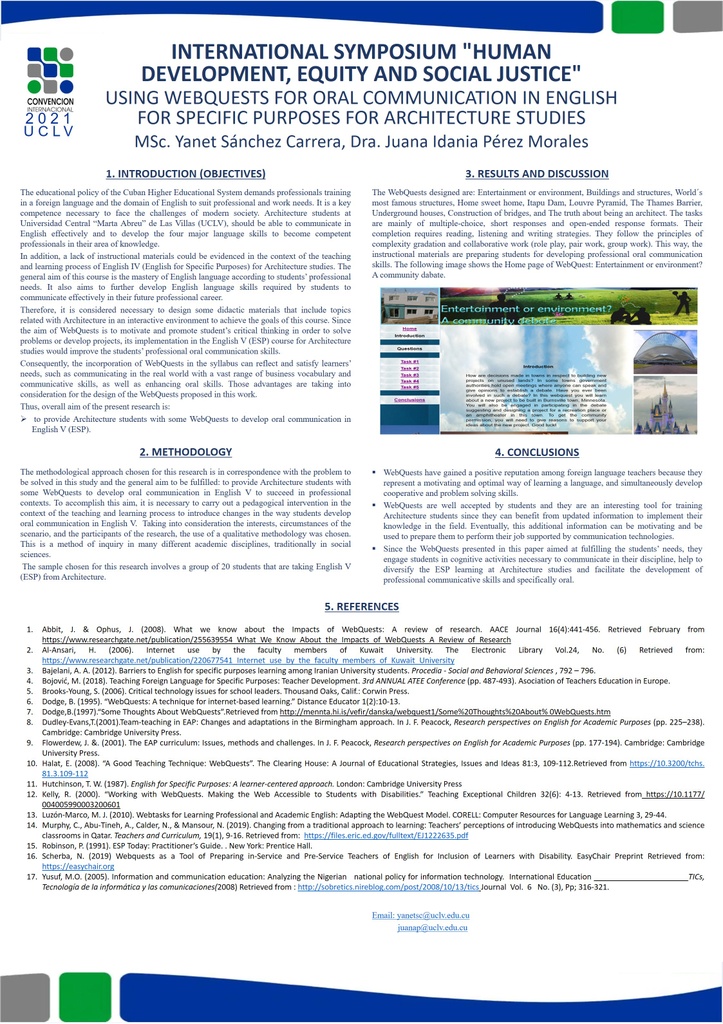Executive Secretary

Simposio Internacional “Desarrollo Humano, Equidad y Justicia Social"

Nowadays, graduates need to use English when accessing the labor market to communicate in professional settings and act strategically to adapt to new communicative situations. They also need to be able to use the new forms of constructing meaning and information that are constantly emerging on the Internet. The WebQuest format (Dodge, 1995) affords the design of learning activities that can be integrated in an English for Specific Purposes (ESP) course to help meet these needs. In this scenario, the WebQuest is a very common way of using Web resources to research a variety of topics, and if appropriately used can contribute to develop both written and oral communication. Oral use of the WebQuest is especially valid for English Foreign Language students for professional purposes. Then, if the use of WebQuests is associated with students’ professional needs, their implementation can be very successful and can help students’ skills both in language and professional development. Architecture students at Universidad Central “Marta Abreu” de Las Villas, have to be able to communicate in English for addressing communication issues in the Architecture sector and meeting the contemporary professional standards and requirements. This paper presents some theoretical considerations for using WebQuests for oral communication in ESP. The research was based on the dialectical materialist method and some methods at the theoretical level, empirical and mathematical-statistical level were used. As a result, some WebQuests were designed to develop oral communication in English for Specific Purposes for Architecture studies.
Actualmente, los graduados necesitan usar el inglés cuando acceden al mercado laboral para comunicarse en situaciones profesionales y actuar estratégicamente para adaptarse a nuevas situaciones comunicativas. También necesitan usar las nuevas formas de construir el significado e información que surgen constantemente en Internet. El formato de WebQuest (Dodge, 1995) proporciona el diseño de actividades de aprendizaje que deben estar integradas en un curso de Inglés con Fines Específicos para satisfacer estas necesidades. En este escenario, la WebQuest es una forma muy común de usar recursos web para investigar una variedad de temas, y si se utiliza adecuadamente puede contribuir a la comunicación escrita y oral. El uso oral de WebQuests es válido para los estudiantes de inglés como lengua extranjera con fines profesionales. Así, si el mismo está asociado con las necesidades profesionales de los estudiantes, su implementación puede ser exitosa y ayudar al desarrollo de sus habilidades lingüísticas y profesionales. Los estudiantes de la Arquitectura en la Universidad Central "Marta Abreu" de las Villas, deben ser capaces de comunicarse en inglés para abordar temáticas sobre Arquitectura y cumplir con los estándares y requisitos profesionales contemporáneos. Este trabajo presenta algunas consideraciones teóricas sobre el uso de WebQuests para la comunicación oral en Inglés con Fines Específicos. La investigación se sustentó en el método dialéctico materialista y se utilizaron métodos del nivel teórico, nivel empírico y matemático-estadístico. Como resultado se diseñaron varias WebQuests para desarrollar la comunicación oral en Inglés con Fines Específicos en la carrera de Arquitectura.
About The Speaker

MsC. Yanet Sánchez Carrera
